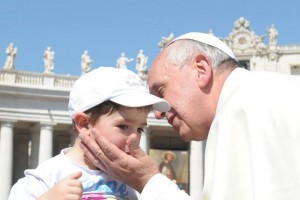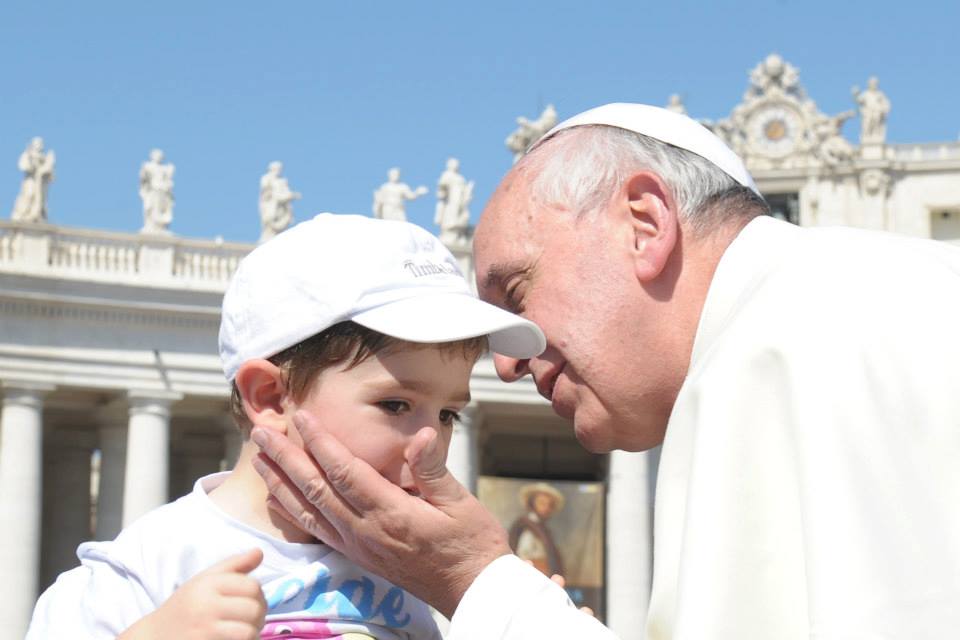In just the past few weeks, Pope Francis has set the Catholic world, and a good many others, atwitter with two wide-ranging interviews: the first, in September, an interview with Antonio Spadaro, S.J., the editor of the Italian Jesuit newspaper Civiltà Cattolica, and the second, in October, with Eugenio Scalfari, the atheist editor of the Italian newspaper La Repubblica. These interviews, as with many aspects of Francis’s pontificate, have generated controversy and discussion as Catholics try to figure out what exactly this pope, who seems so different from his predecessors, is up to.
 It seems to me that Pope Francis is trying to get us to think about the process of communication, not just what is said, as important as that is, but how that message is passed from one person to another. As any student of communication knows, it involves not just a messenger and a message, but also a receiver. Therefore I will divide these reflections into three sections: one on the “genre” of Pope Francis’s teaching, one on its reception, and a concluding section on Francis’s focus on subjectivity.
It seems to me that Pope Francis is trying to get us to think about the process of communication, not just what is said, as important as that is, but how that message is passed from one person to another. As any student of communication knows, it involves not just a messenger and a message, but also a receiver. Therefore I will divide these reflections into three sections: one on the “genre” of Pope Francis’s teaching, one on its reception, and a concluding section on Francis’s focus on subjectivity.
Genre
In a recent story, Catholic News Service’s Vatican bureau chief Francis X. Rocca relates Vatican spokesman Federico Lombardi’s efforts to explain Pope Francis’s style. Lombardi described Francis’s “conversational” style, noting, “This is a genre to which we were not accustomed.”
Although it is comical to me to think about Vatican bureaucrats trying to wrap their minds around this strange and foreign genre of discourse known as the “conversation,” Lombardi has a serious point. We do need to understand the genre the pope is using to properly interpret what he is saying: “Let’s take it for what it is, seeking to interpret it correctly.” Lombardi’s primary concern, however, seems to be damage control for Pope Francis’s more controversial remarks in the interviews, as he asserts that the more spontaneous the pope’s comments are, the less weight the carry. This seems to be missing a larger point, however.
The genre or style of a text is not just a neutral vehicle for the text’s message; it helps shape the reader or hearer’s experience of the text. If done well, the style reinforces or even deepens what is communicated through the semantic meaning of the text. For a well-known example from literature, consider Edgar Allan Poe’s “The Raven”; the persistent rhythms of the poem and its repetitions of sounds and words generate within the reader the narrator’s own feeling of anxiety.
In the world of theology, we recognize this truth in our study of the Bible, for example analyzing the internal structure of a parable or the stylistic qualities of an ancient epistle. In historical theology we also recognize the significance of a theologian’s genre of writing, such as the quaestio method used by Thomas Aquinas. It is surprising, then, that relatively little has been written on the question of genre and style concerning magisterial statements and other statements such as Pope Francis’s interviews.
The church historian John W. O’Malley, S.J. has done some pioneering work in this area, analyzing the rhetorical style of the documents of the Second Vatican Council. O’Malley argues that “The council adopted a new style of discourse and in so doing set forth through that style a striking teaching on how the Church was to be.” Notice his point that the style of the documents, and not just their content, says something about the nature of the church. In my own research, I am among other things trying to make a similar analysis of the popes’ social encyclicals.
We should also do the same thing with Pope Francis’s interviews. Rocca provides his own helpful analysis of Francis’s style, writing: “When the pope speaks in an untraditional way, the world takes heed, and the novel charm of an informal papal voice opens up possibilities for engaging audiences ordinarily unreceptive to Vatican pronouncements.” Francis’s comments have this potential to reach people because they are self-consciously crafted as a personal encounter between Francis and the interviewer.
One can see this point by contrasting Francis’s interviews with those of his two predecessors. In 1994, Pope John Paul II’s interview with Vittorio Messori, Crossing the Threshold of Hope, was published and became an international bestseller, and a second interview, Memory and Identity, was published soon before his death in 2005. Similarly, Pope Benedict XVI was interviewed by Peter Seewald for Light of the World, and even in his position as Prefect of the Congregation for the Doctrine of the Faith gave two book-length interviews: The Ratzinger Report with Messori and Salt of the Earth with Seewald. These interviews are all substantive and significant, but it is also very clear that the questions are “softballs” intended to allow the two men to expound upon some issue. As warmly as John Paul and Benedict might have regarded their interviewers, their responses are primarily aimed at a worldwide audience.
With Francis, on the other hand, it is obvious that he is engaged in a personal encounter with his questioner, especially in his interview with Scalfari. Consider the following exchange:
Scalfari: Do you feel touched by grace?
Francis: No one can know that. Grace is not part of consciousness, it is the amount of light in our souls, not knowledge nor reason. Even you, without knowing it, could be touched by grace.
Scalfari: Without faith? A non-believer?
Francis: Grace regards the soul.
Scalfari: I do not believe in the soul.
Francis: You do not believe in it, but you have one.
Scalfari: Your Holiness, you said that you have no intention of trying to convert me and I do not think you would succeed.
Francis: We cannot know that, but I don’t have any such intention.
Although Francis does give a brief theological comment on grace, his primary focus is on responding to Scalfari as a person. It is evident that Francis has sought to understand Scalfari and seeks to reach out to him as a unique individual. One can see in Scalfari’s response, his perception that Francis is trying to “convert” him, that Francis has succeded; Scalfari perceives the pope’s word as a message he must respond to, in one way or another, from the depths of his being.
Now Pope Francis is aware that his comments will be read by a huge global audience, but I believe the fact that he nevertheless conducts the interviews in such a personal way is part of what he wants to communciate to that audience. In fact, Pope Francis has been helpful enough to say this himself. In the section of his interview with Spadaro where he touches on contentious moral issues, Francis says, “We must always consider the person. Here we enter into the mystery of the human being. In life, God accompanies persons, and we must accompany them, starting from their situation. It is necessary to accompany them with mercy.” The proclamation that “Jesus has saved you,” which touches the person at his or her core, is a more effective response to sin than either rigor or laxity.
Reception
Clearly, then, Pope Francis shows a great deal of concern with how his words are received. Yet one of the most trenchant criticisms of his comments is that Francis has been naïve about how those words will be received in Western, secularized, relativistic cultures. For example, R.R. Reno, the editor of First Things, writes in response to Francis’s controversial statements on abortion, homosexuality, and contraception in his interview with Spadaro, that while “In themselves these statements are obvious and non-controversial,” they, or at least their manner of phrasing, “do not challenge but instead reinforce America’s dominant ideological frame.” This sentiment is echoed by conservative writer Rod Dreher: “his remarks will be received as the Pope saying that this stuff doesn’t matter all that much.” Reinforcing Reno and Dreher’s fear, after the interview was published, NARAL Pro-Choice America released a banner ad stating, “Dear Pope Francis, Thank you. Signed, Pro-choice women everywhere.”
There is a certain truth in this concern. When Francis claims that the church “cannot insist only on issues related to abortion, gay marriage and the use of contraceptive methods,” “cannot be obsessed with the transmission of a disjointed multitude of doctrines to be imposed insistently,” he is asking us to make a distinction between an obsessive or legalistic approach to these issues and “talk[ing] about them in context.” Yet for a large segment of our culture, this distinction does not make any sense. As Pope John Paul II wrote in his encyclical Centesimus Annus, “Those who are convinced that they know the truth and firmly adhere to it are considered unreliable from a democratic point of view” (#46). As even the Supreme Court has suggested, to oppose same-sex marriage, for example, can only be the result of animus. A pope seemingly challenging the priorities of activists on these issues appears to give ammunition to this mindset.
In one of the most insightful commentaries on Francis’s interviews that I have read, Nathaniel Peters claims that rather than being naïve about or unaware of how his words will be taken, Pope Francis is in fact quite conscious of how his words will be received, by his intended audience. For example, in his interview with Scalfari, Francis claims that “Each of us has a vision of good and of evil. We have to encourage people to move towards what they think is Good.” Some have suggested that the pope is veering dangerously close to moral relativism here. Peters, however, helpfully points out that we must consider that Francis is speaking to an atheist in largely secular Italy. An appeal to God would fall on deaf ears. Perhaps many without God in their lives struggle to hear the voice of their own conscience, so Francis’s insistence that they are in fact drawn toward the Good is leading them closer to a fuller, truer life, even if his statement does not present the complete Catholic view of conscience.
Likewise, it is important to keep in mind that Francis’s interview with Spadaro was conducted on behalf of Jesuit journalists and, in contrast to the La Repubblica interview, is geared much more to a Catholic audience. His comments on moral issues are intended as a reflection on Christians’ priorities and faithfulness in living the Gospel, not as a commentary on public policy (as Mark Movsesian has noted, in this interview the pope “said virtually nothing about politics.”). Of course, Francis’s words are not restricted to his primary audiences, which leads to misunderstanding and misinterpretation. Rather than being unaware of this, however, I think that Pope Francis believes this is a risk worth taking. A church focused on living the Gospel will be a more powerful message than any misunderstandings of Francis’s words.
Subjectivity
In his 1908 work L’intellectualisme de saint Thomas and his 1910 work Les yeux de foi (The Eyes of Faith), the theologian Pierre Rousselot, S.J., challenged the reduction of faith to intellectual assent to a set of propositions. Without denying the importance of propositional and creedal statements, Rousselot insisted that faith demands a response of the entire person (remember Scalfari’s response to Francis’s comments). A similar insight guided earlier Protestant theologians such as Albert Ritschl and Soren Kierkegaard, who claimed that faith is a judgment that requires absolute personal commitment. These theologians emphasized the true subjectivity of faith. The point here is not that faith is subjective in the sense of relativistic, in contrast to objective knowledge, but rather subjective in that it is the faith of a subject.
When we recognize the subjectivity of faith, then we realize that the proclamation of the Gospel must take into consideration such things as affectivity, experience, and relationship. Rousselot’s theology influenced a whole generation of theologians who went on to be the guiding voices of the Second Vatican Council; his insight into faith has gradually influenced the faith and practice of the Catholic Church. Pope Francis’s controversial yet inspiring interviews reflect his own appropriation of this insight into his pastoral method. If we are to better understand what he is doing, then, we need to not only consider the doctrinal content of papal statements, but also think more deeply about the genre or style of those statements and how the Gospel message is received by those potentially drawn toward faith.




“Woe to you, when all people speak well of you, for so their fathers did to the false prophets.” ~ Jesus